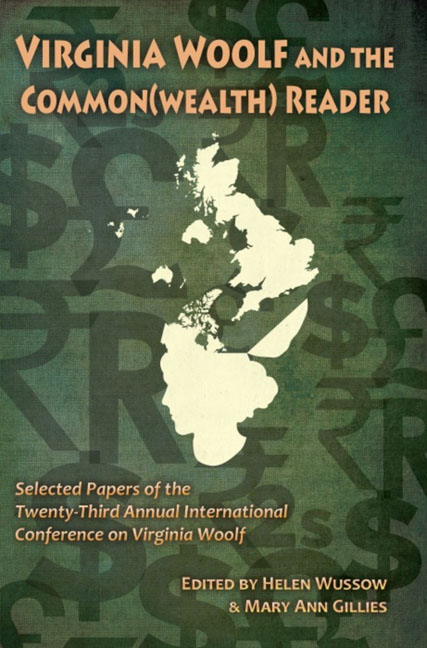Book contents
- Frontmatter
- Contents
- Introduction to Virginia Woolf and the Common(wealth) Reader
- Acknowledgments
- List of Abbreviations
- Invocations
- Networks of Affiliation: Foundations and Friends
- Woolf and the Commonwealth
- 1930s Onwards
- Woolf Beyond the Book
- Preserving Our History of Reading Woolf: The Common Wealth of Our Past and Future
- Adventures in Common: Investing with Woolfs and ”Securitas”
- Printing “Prelude”: Virginia Woolf's Typsetting Apprenticeship and Katherine Mansfield on “Other People's Presses”
- The Hogarth Press, Digital Humanities, and Collaboration: Introducing the Modernist Archives Publishing Project (MAPP)
- Woolf Blogging, Blogging Woolf: Using the Web to Create a Common Wealth of Global Scholars-Readers
- Notes on Contributors
- Conference Program
Preserving Our History of Reading Woolf: The Common Wealth of Our Past and Future
from Woolf Beyond the Book
- Frontmatter
- Contents
- Introduction to Virginia Woolf and the Common(wealth) Reader
- Acknowledgments
- List of Abbreviations
- Invocations
- Networks of Affiliation: Foundations and Friends
- Woolf and the Commonwealth
- 1930s Onwards
- Woolf Beyond the Book
- Preserving Our History of Reading Woolf: The Common Wealth of Our Past and Future
- Adventures in Common: Investing with Woolfs and ”Securitas”
- Printing “Prelude”: Virginia Woolf's Typsetting Apprenticeship and Katherine Mansfield on “Other People's Presses”
- The Hogarth Press, Digital Humanities, and Collaboration: Introducing the Modernist Archives Publishing Project (MAPP)
- Woolf Blogging, Blogging Woolf: Using the Web to Create a Common Wealth of Global Scholars-Readers
- Notes on Contributors
- Conference Program
Summary
In a kind of periphrasis (Dupriez 336) or opening a closed compound word or going back to commonwealth's Middle English roots meaning “public welfare” or “the general good” (oxforddictionaries.com) or the “good of the community” (OED), this paper will evoke and explore the common wealth in what Woolf once called the “commonwealth of the future” (MT 132). I will suggest not only how current archival practices are used in preserving unique and enduring records, but also how access to these records enhances our reading of Woolf and informs the history of Woolf Studies, which is central to the “mandate” of the International Virginia Woolf Society (IVWS): “[T]o foster and encourage the scholarly study of, critical attention to, and general interest in, the work and career of Virginia Woolf, and to facilitate communication and share knowledge between all people interested in her writings” (“Administrative History”). What emerges are the ways in which current and future repositories of our historical records inform this common wealth of our appreciation and the fluidity of boundaries both within and outside the Commonwealth.
My paper demonstrates that our common wealth is based on memory—as a foundation of history—and that it may be found in the International Virginia Woolf Society Archive, which is housed at the E. J. Pratt Library, Victoria University, University of Toronto, and, particularly, in the “oral history” recorded by founding members of the Virginia Woolf Society on 31 July 1993.
In the oral history, J. J. Wilson, Lucio Ruotolo, and Madeline Moore, three of the earliest and most influential readers and teachers of Woolf, met with Eileen Barrett and Merry Pawlowski, then Historians of the Virginia Woolf Society, to discuss its evolution.
Not confined to institutional memory, a standard definition of an archive, this oral history informs the origins both of Woolf Studies and of the Virginia Woolf Society, which, since 1996, has been the International Virginia Woolf Society. In recognizing the value of this oral history in particular, we come closer to understanding that, whatever the differences in our readings and approaches, the records preserved at the IVWS Archive inform our common wealth.
- Type
- Chapter
- Information
- Virginia Woolf and the Common(wealth) Reader , pp. 198 - 204Publisher: Liverpool University PressPrint publication year: 2014



